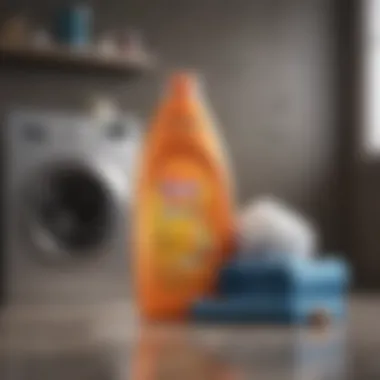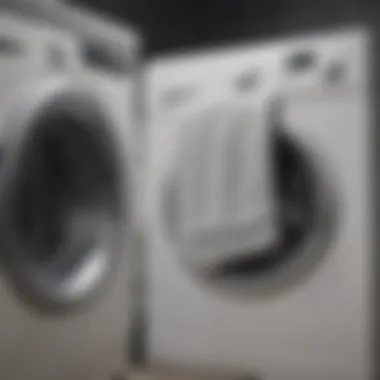How to Eliminate Funky Smell from Towels Effectively


Intro
Towels are more than just utility items in our daily lives. They serve as a comforting presence after a shower or a functional aid during cleaning tasks. Yet, many homeowners encounter the problem of funky smells emanating from these seemingly innocent fabrics. The causes are numerous: dampness, bacteria, and improper washing practices can all contribute to the unwelcome odors clinging to towels. Addressing this issue is essential not only for personal hygiene but also for creating a pleasant home environment.
This guide will explore effective strategies to eliminate foul smells from towels. We will delve into practical cleaning methods, recommended detergents, and ongoing maintenance tips to lengthen the lifespan of your towels while keeping them fresh-smelling. By adhering to these guidelines, you can enjoy the full benefits of your towels and enhance your laundry experience.
Understanding the Causes of Funky Towel Smells
Understanding the origins of undesirable smells in towels is crucial. Recognizing these causes allows homeowners to avoid recurring issues. It is common for towels to retain scents that are not pleasant, and this can diminish their usability. Examining the underlying factors will provide insight into effective solutions.
Moisture Retention
Moisture is one of the primary contributors to towel odors. When towels are not dried properly, they become breeding grounds for bacteria and mold. This dampness leads to funkiness that can be challenging to eliminate. Towels should be dried thoroughly after each use, ideally in a well-ventilated area. It is also important to wash towels frequently to prevent moisture buildup.
Bacterial Growth
Bacteria thrive in warm, moist environments, and unkept towels provide the perfect setting for their growth. These microorganisms produce waste, releasing volatile compounds that generate unpleasant odors. Using a towel that has been stored without proper drying can lead to increased bacterial colonization. To combat this, consider using higher wash temperatures to kill bacteria effectively.
Improper Drying
Improper drying techniques significantly contribute to foul smells. Many individuals overlook the importance of proper drying methods. Hanging towels in a closed space with limited airflow can trap moisture. Sunlight and open air can help dry towels more effectively because sunlight has natural disinfecting properties. Facility drying at the wrong settings can also be detrimental.
Detergent Residue
Another common reason for funky towel smell is the residue left by detergents. Overusing detergent leads to buildup, which attracts and traps odors. This residue can inhibit the towel's absorbency, making it less effective. Choosing the right amount of detergent is key. Moreover, opting for a cleaner that rinses completely can minimize this problem. Using less detergent can actually help in keeping towels fresher.
Identifying the Problematic Towel
Understanding how to identify which towels have developed a funky smell is crucial in maintaining a fresh and pleasant laundry experience. Not all towels are created equally when it comes to odor retention. Therefore, recognizing the signs that indicate a problem can significantly improve the overall care and functional lifespan of your towels. By effectively identifying those problematic towels, you create a targeted approach for cleaning and maintenance, ultimately saving time and resources. This section will explore how to perform a visual inspection, execute a smell test, and take fabric type into account when diagnosing towel issues.
Visual Inspection
The first step in identifying a problematic towel is visual inspection. Look closely at the towel’s surface for signs of mildew or marks that may indicate excess dampness. Areas that appear discolored or oddly textured might be hosting bacteria. Pay special attention to folds and crevices where moisture may remain trapped.
- Check for dark spots or discoloration, which can be a clear indicator of mold or mildew.
- Inspect for any stiffness or loss of softness. This can suggest build-up from personal care products or detergent residues.
- Look out for any unusual wear or fading, which might suggest that these towels have been through too much washing or have aged poorly.
This method provides immediate insights into the health of your towels. If many towels show signs of wear or staining, it may indicate a broader issue with the washing process.
Smell Test
Next, the smell test is a reliable method to determine if a towel is problematic. Odor can be subjective, but there are general guidelines to follow. To perform the smell test:
- Hold the towel close to your nose. Take a deep inhale, noticing any musty or sour notes.
- Roll it up tightly for a few moments, then release and smell again. Sometimes odors are more potent when tightly packed.
- Compare with a clean towel. Place it next to a freshly washed towel for a distinct contrast.
If the problematic towel gives off any unpleasant odors despite being freshly cleaned, it signals a deeper issue that needs addressing. Keeping an open mind about how long it has been since the towel was last washed can also inform how critical the smell issue may be.
Fabric Type Considerations


Different materials behave differently in terms of odor retention. Knowing the fabric type helps in understanding why some towels may hold odor more than others. Common fabric types include cotton, bamboo, and microfiber.
- Cotton Towels: Generally absorbent but can retain moisture. A cotton towel left damp can develop an odor quickly.
- Bamboo Towels: Known for their softness and antibacterial properties, yet still require prompt drying.
- Microfiber Towels: These are less likely to hold onto odors due to their quick-drying nature but can still smell if not maintained properly.
When selecting towels, consider the fabric's capabilities. Alternatively, if an existing towel begins to smell, evaluating its fabric type could help in deciding the appropriate cleaning technique.
Washing Techniques to Remove Odors
Washing techniques play a crucial role in keeping towels free from unpleasant smells. Proper washing not only eliminates existing odors but also helps in preventing their return. Without appropriate methods, towels may retain moisture and attract bacteria, which results in funky smells. Therefore, understanding how to wash towels effectively is essential for maintaining freshness.
Appropriate Wash Settings
In order to combat odor, it is significant to select the correct washing machine settings. Using a heavy-duty or deep-clean cycle can give your towels a more thorough wash. Standard wash cycles may not be sufficient to eliminate built-up dirt and bacteria. High spin speed is also important; it helps to remove excess water from towels, which reduces drying time and prevents mold formation. When washing bath towels, set your machine to load size according to the quantity you are washing. This ensures that the towels have ample space to move around and rinse properly.
Temperature Considerations
Temperature is another crucial factor when washing towels. Hot water is effective in breaking down oils and removing bacteria. A temperature of at least 60 degrees Celsius (140 degrees Fahrenheit) is generally recommended for optimal cleaning. However, some fabrics may require cooler temperatures to avoid damage. Always check the care label on your towels to ensure you are using a suitable wash temperature.
Using Vinegar as a Natural Deodorizer
Vinegar is a natural deodorizer and can be a valuable addition during the washing process. Adding white vinegar to your wash cycle can help neutralize odors and soften towels. It works by breaking down detergent residues and mineral build-up. Simply add half a cup of white vinegar in the rinse cycle. This method is safe for most fabrics. It can also help to remove stubborn smells without chemicals that may irritate sensitive skin.
Baking Soda Method
Baking soda is another effective natural remedy for removing odors from towels. Its alkaline properties allow it to absorb moisture and neutralize smells. For best results, add one cup of baking soda along with your regular detergent in the wash cycle. This will enhance the cleaning power of your detergent and leave your towels smelling fresh. If the odor persists, consider soaking the towels in a solution of water and baking soda for a few hours before washing.
Adding vinegar or baking soda to your washing routine can greatly enhance the freshness of your towels.
By applying these washing techniques, you can significantly improve the scent and hygiene of your towels, ensuring they remain pleasant and functional over time.
Choosing the Right Detergents
Selecting the proper detergent plays a crucial role in maintaining the freshness of towels. A suitable detergent not only cleans effectively but also prevents the buildup of residues that can contribute to foul odors. Understanding the different types of detergents available helps in making informed choices that can enhance the laundry experience. Here are key elements to consider when choosing detergents for your towels:
- Cleaning power: Some detergents have ingredients designed specifically to tackle stubborn odors and stains.
- Residue buildup: Not all detergents rinse away completely, which can cause unpleasant smells to linger.
- Compatibility with fabrics: Certain detergents work better with specific towel materials.
High-Efficiency Detergents
High-efficiency detergents are formulated to produce fewer suds and are optimized for use in high-efficiency washers. These detergents are strong in effectiveness, helping to remove dirt and odors while ensuring that towels come out fresh. The low-sudsing formula allows for thorough rinsing, reducing any potential leftover residue that may contribute to smells. When washing towels, using a high-efficiency detergent can lead to better overall results, prolonging the life of the fabric while keeping it odor-free.
Enzyme-Based Detergents
Enzyme-based detergents use biological enzymes to break down stains and odors at a molecular level. This type of detergent can be particularly effective for towels that have absorbed organic materials, such as body oils and sweat. Enzymes can essentially digest these odors and help restore freshness. They work best in warm water, allowing the enzymes to become activated and function efficiently. Choosing a detergent that incorporates enzymes can significantly enhance your towel cleaning routine.
Avoiding Fabric Softener
While fabric softeners can make towels feel smoother, they often leave a residue that causes fabrics to retain odors. These softeners can coat fibers, providing a barrier that prevents proper cleaning. As a result, moisture and bacteria can become trapped within, leading to musty smells over time. Instead of using fabric softener, consider alternatives such as white vinegar in the rinse cycle. This helps to maintain the softness of towels without the drawbacks associated with traditional softeners.


Proper detergent choice cannot be underestimated when it comes to eliminating funky smells from towels.
Choosing the right detergent is integral for keeping towels fresh. By focusing on high-efficiency and enzyme-based options while avoiding fabric softeners, you can enhance laundry outcomes and maintain pleasantly fragrant towels.
Drying Techniques for Optimal Freshness
Drying towels effectively is vital for maintaining their cleanliness and preventing any funky smells. An appropriate drying method minimizes moisture retention, which is a primary cause of bacterial growth that leads to unpleasant odors. It is not just about making towels look dry; it's about ensuring they are thoroughly dried in a manner that inhibits the issues associated with dampness.
Air Drying Benefits
Air drying is one of the simplest and most effective methods to keep towels smelling fresh. This process allows towels to dry naturally, reducing the risk of overheating or damage that might occur in tumble dryers.
Some benefits of air drying include:
- Cost Efficiency: Utilizing natural airflow saves energy, which reflects positively on utility bills.
- Gentler on Fabrics: It avoids the high heat of machines that can wear down the fibers over time. This extends the lifespan of the towels.
- Mildew Prevention: Proper air circulation can help keep towels mold-free, as moisture is not trapped.
- Scent Preservation: The natural drying method often retains the fresh aroma from laundry detergents better than a tumble dryer.
To effectively air dry towels, hang them in a well-ventilated space. Choose sunny, breezy environments if possible, as sunlight can also act as a natural disinfectant.
Effective Use of Tumble Dryers
Using a tumble dryer can be efficient for drying towels, providing a quick turnaround. However, it is crucial to use it correctly to maximize its effectiveness. Start by selecting the right settings to ensure that towels receive the needed heat without causing damage.
- Medium Heat Setting: High heat can cause fibers to break down. A medium setting still dries them thoroughly without excessive harshness.
- Drying Time: Monitor the time. Over-drying can negatively impact fabric strength and absorbency.
- Dryer Balls: Adding dryer balls can help by allowing better airflow between items, ensuring even drying.
Tumble dryers can be particularly effective in colder months when outdoor drying isn’t feasible.
Avoiding Overloading Dryers
When using a tumble dryer, avoid overloading. It might be tempting to dry all towels at once, but overloading can lead to various issues. Here are some points to consider:
- Ineffective Drying: If towels are packed too tightly, they won't dry evenly. Some parts may remain damp, creating a breeding ground for bacteria.
- Increased Wrinkling: Overloaded dryers make it difficult for towels to move freely, resulting in more wrinkles that can be frustrating.
- Shortened Lifespan of Machine: An overloaded dryer puts excessive strain on the machine, potentially leading to repairs or breakdowns.
In summary, ensuring that towels are dried properly is essential to maintaining their function and smell. Whether by air drying or using a tumble dryer, following best practices will lead to effective results. Properly dried towels are more pleasant to use and will retain their quality longer, contributing to overall home cleanliness.
Long-Term Maintenance Tips
Maintaining the freshness of your towels is not just about occasional washes. Long-term upkeep is vital to ensure that the towels stay pleasant to the touch and free from funky odors. Implementing simple practices can significantly prolong the life of your towels and minimize unpleasant smells.
Regular Washing Schedule
Establishing a regular washing schedule for your towels is crucial. A consistent routine helps in reducing bacteria buildup and musty odors. Ideally, bath towels should be washed every three to four uses, while hand towels may require washing more frequently as they tend to get damp more often.
In addition, avoid washing towels with other heavily soiled items. This can lead to cross-contamination of odors and bacteria. Following a dedicated towel wash can be more efficient and ensures thorough cleaning.
Storage Practices
How you store your towels can also influence their freshness. After washing and drying, ensure that towels are completely dry before folding or stacking them. This practice prevents moisture retention, which can lead to mildew and unpleasant smells.


Store towels in a well-ventilated area, away from direct humidity sources like bathrooms or kitchens. If possible, use linen closets or drawers that allow air circulation. Avoid overcrowding in storage spaces, as this prevents towels from breathing and retaining freshness.
Preventing Overuse
Overusing towels is another factor that can lead to persistent odors. Designate specific towels for particular purposes, such as bathing, hand drying, and kitchen use, to reduce wear and tear on any single towel.
Rotate towels regularly to allow each one a chance to dry and air out properly. Adopting this practice not only helps in minimizing odors but also extends the lifespan of the towels. Remember, a towel's effectiveness diminishes when it is repeatedly used without proper care.
Key Takeaway: Committing to a maintenance routine for your towels will not only keep them smelling fresh but also enhance your overall laundry experience.
Signs Your Towels Need Replacement
Recognizing when towels have reached the end of their useful life is crucial for maintaining cleanliness in your home. Replacing worn towels not only improves your laundry quality but also enhances your overall hygiene. This section discusses specific signs that indicate it's time to retire your towels and why it matters.
Texture Degradation
One of the first signs that towels may need replacement is texture degradation. When towels are frequently washed, used, and dried, they can lose their plushness. The fibers begin to wear down, leading to a scratchy feel that does not absorb moisture effectively. A towel should feel soft against the skin, offering comfort after a shower or bath. If a towel feels more like sandpaper than a gentle cloth, it is a clear signal that it has lost its functional quality.
Additionally, continuous wear may create uneven patches in the fabric, diminishing its aesthetic appeal. Therefore, it's beneficial to regularly assess the feel of each towel in your collection to ensure they meet your comfort needs.
Persistent Odor
Even after washing, some towels may carry a lingering odor. If you find that a towel retains an unpleasant smell—even after using various cleaning methods—it may be time for a replacement. Persistent odors are often a result of bacteria or mold that has seeped deep into the fibers. Despite the best efforts in washing techniques or deodorizing solutions, these smells may not fully go away.
Using a towel that still smells funky can not only be unpleasant but can also lead to the transfer of smells to your body or other clean items around the home. It is advisable to trust your senses. If washing fails to eliminate the odors, consider replacing that towel.
Fading Colors
Fading colors can indicate that towels have been subjected to harsh detergents or excessive washing cycles. While some fading may occur naturally over time, significant loss of color can be a sign of wear. Towels that have faded may look less appealing in your bathroom or laundry room.
Moreover, when towels lose their color, it could mean that they are losing some of their effectiveness due to fiber damage. Fresh towels not only serve a practical purpose but also contribute to the overall decor of your space. Aesthetic appeal should not be overlooked, as vibrant colors can enhance the look of your interiors.
Finale
Understanding how to eliminate funky smells from towels is essential for maintaining a clean and inviting home. Towels are used regularly, and their odor can significantly affect the perception of cleanliness in your bathroom or kitchen. A consistent approach to washing, drying, and storing towels can prevent unpleasant scents from developing and promote a more hygienic environment.
Summarizing Effective Strategies
To ensure towels remain fresh, implement the following key strategies:
- Wash regularly: Establish a consistent washing schedule, ideally after every three uses.
- Choose the right detergent: Utilize high-efficiency and enzyme-based detergents that can effectively break down odors.
- Dry properly: Ensure towels are thoroughly dried either in the dryer or through air drying, as dampness encourages bacteria.
- Utilize natural deodorizers: Incorporate vinegar or baking soda during wash cycles to enhance odor removal.
- Inspect towels: Regularly check for signs of wear, such as fading or persistent odors, which may indicate that it’s time for replacement.
These strategies will not only eliminate odor but also prolong the lifespan of your towels.
Final Thoughts on Towel Care
Caring for towels goes beyond just washing them. It involves understanding the materials, the conditions they are subjected to, and how to maintain their quality. Avoid overloading your washing machine, which can minimize the effectiveness of cleaning cycles. Practicing proper storage techniques will also ensure that towels remain dry and free from unwanted smells between uses.
By adopting these habits, you contribute to a more pleasant and hygienic home environment. Remember that simple, consistent actions can lead to profound benefits, transforming your towels from being a source of annoyance to a symbol of cleanliness and comfort.
"The simple act of caring for towels properly can significantly enhance both their lifespan and your home’s atmosphere."
By integrating these elements into your towel care routine, you will effectively combat funky smells and elevate your laundry experience.



